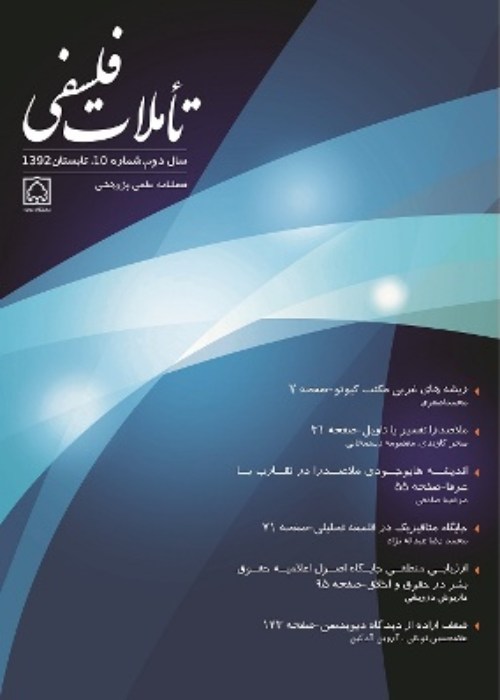Is Utilitarianism Just the Same as Hedonism? Analyzing Bentham and Mill's Views
Author(s):
Abstract:
If we divide ethical issues and theories into three subdivisions of descriptive, normative and analytical (meta-) ethics, surely we have to place the consequentialist and deontological theories under the rubric of normative ethics, since these theories discuss about ‘good’ and ‘bad’ conducts and concepts like ‘ought’ and ‘ought not’. One of the most important schools within the consequentialist normative ethics is utilitarianism, about which the present essay is concerned. In the majority of Persian works, both original and translated, utilitarianism has been taken as a synonym with hedonism, and hedonism has been construed as seeking bodily pleasure and happiness. In fact, the distinction between hedonism and utilitarianism in these works has become blurred. Utilitarianism, in essence, says that the result of every action of man is to be evaluated on the basis of the principle of utility. The goodness of an action thus depends on the average of benefit or usefulness which can be attributed to its consequences, which the latter ones in their turn can be measured on the basis of pleasure and enjoyment. The badness of an action, likewise, depends on the average of pain or suffering which can be attributed to its consequences. The present paper, in the first place, will investigate the history and development of various kinds of utilitarianism. It also explains and clarifies the characteristics of the views of Jeremy Bentham (1748- 1832) and John Stuart Mill (1806-1873) and then compares these two. Secondly, the papers will investigate the manner in which Mill and Bentham's theories, on the basis of the principle of utility, take particular actions as ethical or unethical. Finally, the paper also argues that pleasure and enjoyment as discussed in these theories, both at the individual and social level, are not undesirable and have nothing to do with indecency or being heinous.
Language:
Persian
Published:
Quarterly Journal of Philosophical Meditations, Volume:2 Issue: 6, 2010
Page:
7
magiran.com/p1043688
دانلود و مطالعه متن این مقاله با یکی از روشهای زیر امکان پذیر است:
اشتراک شخصی
با عضویت و پرداخت آنلاین حق اشتراک یکساله به مبلغ 1,390,000ريال میتوانید 70 عنوان مطلب دانلود کنید!
اشتراک سازمانی
به کتابخانه دانشگاه یا محل کار خود پیشنهاد کنید تا اشتراک سازمانی این پایگاه را برای دسترسی نامحدود همه کاربران به متن مطالب تهیه نمایند!
توجه!
- حق عضویت دریافتی صرف حمایت از نشریات عضو و نگهداری، تکمیل و توسعه مگیران میشود.
- پرداخت حق اشتراک و دانلود مقالات اجازه بازنشر آن در سایر رسانههای چاپی و دیجیتال را به کاربر نمیدهد.
In order to view content subscription is required
Personal subscription
Subscribe magiran.com for 70 € euros via PayPal and download 70 articles during a year.
Organization subscription
Please contact us to subscribe your university or library for unlimited access!


